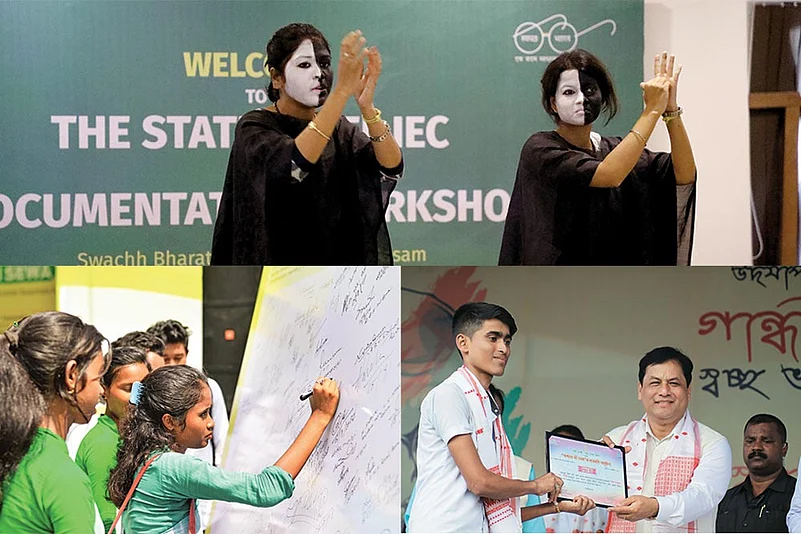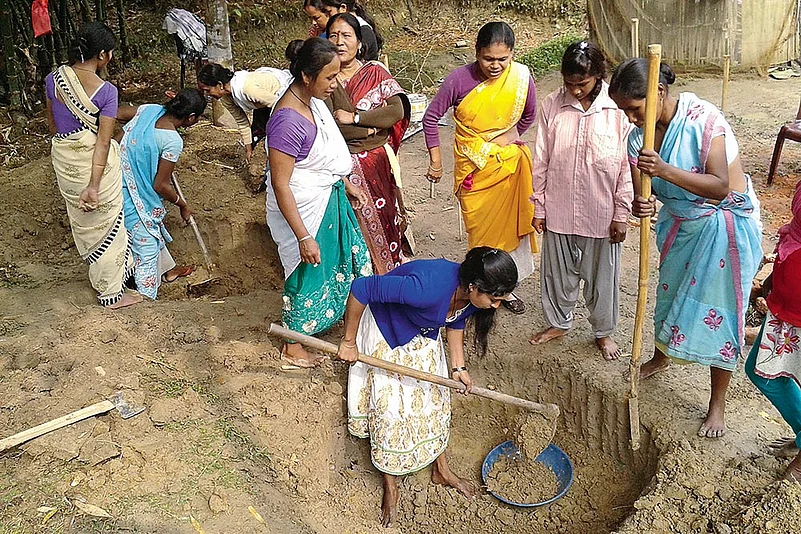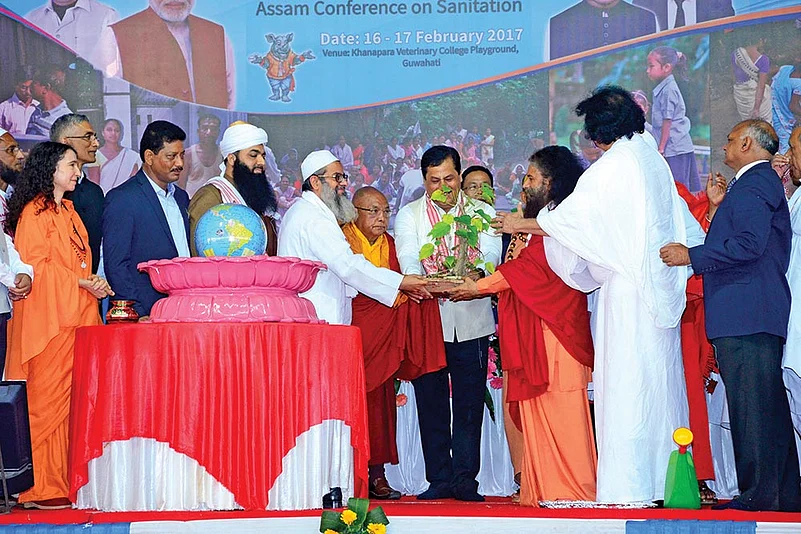Background
Like the rest of the country, Swachh Bharat Mission was launched on 2nd October, 2014 in Assam. However, the implementation was tardy with only 172 villages out of the total 26,395 villages in Assam becoming Open Defecation Free till Mid 2016.
The Turnaround
As soon as the new government took over, sanitation became one of the top priorities. An ad-hoc implementation structure gave way to a forward looking Mission Directorate. The leadership provided by the Chief Minister, Sri. Sarbananda Sonowal, the Public Health Engineering Minister, Sri Rihon Daimari and the Mission Director of the Swachh Bharat Mission (Gramin) Assam, Dr.Siddharth Singh ensured that the Programme became what it was always meant to be, a people’s movement. Inclusive, innovative approach, reliance on social behavior change communication became the cornerstone of the mission, rather than the construction driven number crunching race.
Approach
The approach adopted was of inclusion of all sections of the society through mass awareness generation. Interpersonal communication through an army of ground level volunteers called Swacchagrahis was extensively employed to reach out to everyone. Mass media, rallies, banners, posters, street plays special events were also used as part of IEC campaign. This was supplemented with provisioning of sufficient funds for hardware activities viz. individual household sanitary toilets and community sanitary complexes. Associated activities like mason training, supply change management for sanitary material were simultaneously planned too.
Innovations
While the normal means were being utilized, a lot of innovative ideas were also put to test, viz:
With a view to foster healthy competition, and to create worthy role models, Swachh Bharat Mission Assam team initiated the concept of cleanest village award. Approximately 26000 villages across 33 districts of Assam were scanned and ranked in terms of cleanliness and hygiene. The cleanest village in every district was awarded and the cleanest village in the entire state was indentified. Rangsapara, a small village in Goalpara district, was found to be the cleanest village in Assam. Interestingly, the entire population of the village is Below Poverty Line. The message is loud and clear, that economic condition and financial resources are not the only determinants of cleanliness (or the lack of it!)
Harnessing Youth Power
Realizing that students can be the best change agents, and that every student from ‘KG to PG’ is involved, the SBM team entered into a partnership with both Gauhati University and Dibrugarh University, reaching more than 400 colleges affiliated with these universities, and bringing thousands of students studying in these institutions into the fold of sanitation movement through formation of health and sanitation clubs and harnessing NSS wings active there. Hundreds of villages were adopted and students assumed leadership role in sensitizing the community. Dibrugarh University has even started courses in solid waste management and sanitation.
Similarly various programmes and competitions were taken up in schools to internalise sanitation and cleanliness as a way of life in the young minds, the most notable being the ‘Green Police’ initiative. A group of motivated students devote sometime after school to stopping people from littering roads, markets, public places, etc. A lot of awareness has been generated by this.
Movie on Sanitation
A full length movie on the theme of sanitation has been made, titled ‘Ajanite Mone Mone’, wherein instead of preaching, entertainment has been used for spreading the message of sanitation in an engrossing manner. This is the first regional movie on the theme.
Daan Toilet
To make the mission people’s movement in the real sense, the concept of ‘Daan Toilet’ has been started in the district of Jorhat, where people are exhorted to donate toilets in the memory of or dedicated to their loved ones, to the families not having them. This fairly simple and emotional appeal has caught up in a big way and several donors have come forward to contribute to the cause. The concept is now being extended to the entire state. The state has also set up a Swachh Assam Kosh to tap Corporate Social Responsibility funds and other voluntary contributions.
The Result
Due to the concerted efforts, astute leadership and perseverance, the sanitation picture of the state has completely changed in less than two years. The percentage of households with access to safe sanitation by way of IHHL has gone up from 52% to 82% by February, 2018. As compared to an approximate amount of 6 lakh toilets provided in 2014-16, a total of nearly 17 lakh toilets have been provided to the public between May, 2016 to February, 2018. The real success however lies in the high percentage usage of these latrines. As per independent surveys conducted by the Government of India, the usage is more than 95%.
While only 172 villages were rid from the bane of open defecation till mid 2016, presently 8200 villages are Open Defecation Free (ODF). Five districts have become completely ODF and Assam appears to be marching on the path of becoming ODF by mid 2018, much earlier than the targeted date of 2nd October 2019.
The Swachh Bharat Mission (Gramin) Assam has come a long way from being a government cleanliness mission to being an agent of social change. The Mission has seen the involvement of all section of the society starting from women Self Help Groups, tea garden workers, school children, to industries, religious leaders, NGOs etc. It has given shape to the aspiration of the people to live in a clean and sanitized environment irrespective of social and economic standings. Most importantly, the involvement of women at various stages of the mission is inspirational. Women have challenged the gender stereotypes. This ‘Jan Andalon’ has brought about a real social change in Assam and the mission aims to take forward the learning in Assam across the country.
***


Women Masons
Recognizing the pivotal role played by women in the household, the Mission team has trained women as masons and they are constructing toilets in several areas. The initiative started in Barpeta district has put women in forefront of the decision making process, and has transformed them into powerful advocates for the cause of sanitation and cleanliness.
















